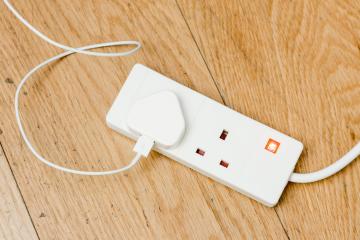
News
October 18, 2025
Households warned to never plug common kitchen appliance into extension lead
There are various home appliances that people should never plug into an extension lead, such as a kettle
**Households warned to never plug common kitchen appliance into extension lead**
Experts are issuing a stark warning to households across the nation: think twice before plugging your kettle, or other high-powered kitchen appliances, into an extension lead. While extension leads offer convenience, using them improperly with certain appliances can pose a significant fire risk and potentially damage your electrical system.
The main culprit behind this danger is power overload. Appliances like kettles, toasters, microwaves, and even some blenders, draw a substantial amount of electricity to operate. Extension leads, particularly older or lower-quality ones, often have a limited current-carrying capacity. When a high-powered appliance is plugged into an extension lead that can't handle the load, the lead can overheat. This overheating can melt the plastic insulation, leading to short circuits and, in the worst-case scenario, a fire.
"People often underestimate the amount of power that everyday kitchen appliances require," explains Sarah Jenkins, a qualified electrician. "A kettle, for example, is designed to heat water quickly, which means it needs a lot of electricity in a short amount of time. Plugging that into an extension lead, especially one that's already powering other devices, is a recipe for disaster."
The warning extends beyond just kettles. Any appliance with a heating element, such as toasters, grills, and deep fryers, should ideally be plugged directly into a wall socket. Similarly, appliances with powerful motors, like microwaves and blenders, also demand a lot of power and should be treated with caution when considering using an extension lead.
So, what's the alternative? The safest option is always to plug high-powered appliances directly into a dedicated wall socket. If this isn't possible due to the location of your appliance or the lack of available sockets, consider having an electrician install additional outlets. While this may involve some initial cost, it's a far safer and more reliable solution than risking a fire.
If you absolutely must use an extension lead, make sure it's a heavy-duty one specifically designed to handle high-wattage appliances. Check the lead's maximum load capacity and ensure it exceeds the wattage of the appliance you're plugging in. Never overload the extension lead by plugging in multiple high-powered devices at the same time. Regularly inspect your extension leads for any signs of damage, such as frayed wires, cracked casings, or loose connections. If you notice any damage,
Experts are issuing a stark warning to households across the nation: think twice before plugging your kettle, or other high-powered kitchen appliances, into an extension lead. While extension leads offer convenience, using them improperly with certain appliances can pose a significant fire risk and potentially damage your electrical system.
The main culprit behind this danger is power overload. Appliances like kettles, toasters, microwaves, and even some blenders, draw a substantial amount of electricity to operate. Extension leads, particularly older or lower-quality ones, often have a limited current-carrying capacity. When a high-powered appliance is plugged into an extension lead that can't handle the load, the lead can overheat. This overheating can melt the plastic insulation, leading to short circuits and, in the worst-case scenario, a fire.
"People often underestimate the amount of power that everyday kitchen appliances require," explains Sarah Jenkins, a qualified electrician. "A kettle, for example, is designed to heat water quickly, which means it needs a lot of electricity in a short amount of time. Plugging that into an extension lead, especially one that's already powering other devices, is a recipe for disaster."
The warning extends beyond just kettles. Any appliance with a heating element, such as toasters, grills, and deep fryers, should ideally be plugged directly into a wall socket. Similarly, appliances with powerful motors, like microwaves and blenders, also demand a lot of power and should be treated with caution when considering using an extension lead.
So, what's the alternative? The safest option is always to plug high-powered appliances directly into a dedicated wall socket. If this isn't possible due to the location of your appliance or the lack of available sockets, consider having an electrician install additional outlets. While this may involve some initial cost, it's a far safer and more reliable solution than risking a fire.
If you absolutely must use an extension lead, make sure it's a heavy-duty one specifically designed to handle high-wattage appliances. Check the lead's maximum load capacity and ensure it exceeds the wattage of the appliance you're plugging in. Never overload the extension lead by plugging in multiple high-powered devices at the same time. Regularly inspect your extension leads for any signs of damage, such as frayed wires, cracked casings, or loose connections. If you notice any damage,
Category:
Technology